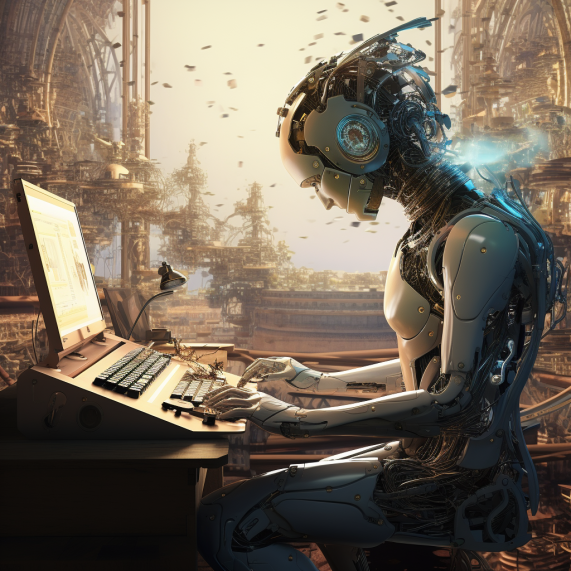Technology has fundamentally reshaped the workforce and the role of humans in it. From the first industrial revolution which mechanized production, to the computer revolution which automated calculations and clerical work, we have repeatedly adopted new tools to take over certain types of labor. Now, we stand at the cusp of a new era as artificial intelligence and robots become capable of not just assisting human workers, but replacing them entirely for some tasks.
This rise of automation is poised to be hugely disruptive for many industries and workers. But it also holds the promise to boost productivity, improve safety, and create new kinds of jobs even as it makes others obsolete. As we transition into this new automated future, what roles will remain for humans? How should society adapt to ensure displaced workers can find new livelihoods? And how can we shape automation technologies to align with human values and needs?
The Automation Job Apocalypse: Exaggerated Fears
Ever since computers entered the workplace, there have been fears that humans would become obsolete. Books like Rise of the Robots paint doomsday scenarios of mass technologically-induced unemployment. Some predict up to 50% of jobs in the US could be automated in the coming decades. However, the consensus among many experts is that these dystopian visions are greatly exaggerated.
Throughout history, technology has disrupted existing work patterns, but also generated new kinds of jobs to replace the old. While automation will certainly displace many existing roles, especially routine manual and cognitive tasks, humans are likely to remain adaptable and find new valuable work. The invention of computers reduced the need for human “computers” to perform calculations, but software development became a huge new field. Industrial robots took over classic manufacturing jobs, but created new roles in engineering, robotics, and oversight.
Rather than a robot apocalypse where humans become irrelevant, automation is more likely to produce a gradual restructuring of the economy. The future probably holds fewer jobs for unskilled laborers, more jobs for technically-trained professionals and creatives, and rising demand for uniquely “human” skills like entrepreneurship, empathy, leadership, and critical thinking.
Winners and Losers: Uneven Impacts
Though fears may be overblown, that doesn’t mean major workforce disruption isn’t coming. The benefits and drawbacks of automation will be very unevenly distributed both between and within professions. AI may generate many new kinds of jobs, but a 55-year-old truck driver may not have the resources or ability to retrain as a software developer. Geographic disparities will likely grow as well, as new jobs cluster in tech hubs while rural areas or Rust Belt towns face ongoing decline.
Within professions too, automation will produce winners and losers. For doctors, AI diagnostic tools may mean less time on routine cases and more ability to focus on the hardest cases. But for paralegals, automation may mean far fewer jobs as eDiscovery software takes over much legal research. Power dynamics and pay scales may shift as some expert roles are devalued while technical and social skills become more valuable.
This uneven impact means automation is likely to exacerbate existing trends of economic inequality and regional disparities. To avoid massive social and political upheaval, the transition will need to be carefully managed with education, job training, investment in impacted communities, and policies that spread the benefits more evenly.
Automation for Social Good
While the business case for automation tends to dominate discussions, there is also an opportunity to direct these technologies towards social good. As machines take over more tedious and dangerous jobs, lower-skilled workers could be free to focus on rewarding work like education, creativity, care-giving, social work, and community-building. Smart public policies could encourage automation not just to enrich corporate owners, but to improve quality of life for all.
Government funding and research initiatives could help develop automation specifically focused on social needs, like agricultural robots that enable more sustainable farming, or delivery robots that bring groceries to elderly people. Policies like universal basic income and stronger social safety nets could help lessen the precariousness of the transition and spread the benefits more evenly. Work could become less about survival and more about purpose as automation tackles the “dirty, dull, and dangerous” jobs.
There are always trade-offs though. Overly rapid automation may leave too many people behind, while slowing it down could reduce potential productivity gains. Humans will likely continue debating the appropriate pace and shape of automation far into the future. But with thoughtful management, automation could propel us towards more just and equitable societies, not just more efficient ones.
Steering the Future of Work
Automation seems inevitable, but its impacts on human lives are not set in stone. Through policies, civil society initiatives, educational reforms, corporate strategies, and more, we can influence the future of work to align with human values.
Now is the time to ask hard questions. How can humans continue finding meaning and purpose in a highly automated world? How should the economic gains of AI be justly distributed? Can algorithms and robots truly reflect social ethics and moral values?
There are no easy answers, but wrestling with these issues is the only way to steer towards a future that reflects humanity’s highest aspirations. It will require open and earnest dialogue between policymakers, business leaders, engineers, ethicists, workers and more. The future remains undetermined, and shared human choices—not just technological forces—will shape it. Through compassion, wisdom and care for all, society can navigate towards justice in the age of intelligent machines.
